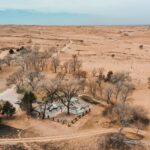Former Massey Energy Co. Chief Executive Officer Donald Blankenship, facing criminal trial over an April 2010 explosion that killed 29 miners, said the year before that he feared a disaster with 100 deaths.
“I don’t want to go to 100 funerals” caused by lax mine fire safety procedures, Blankenship told then-Massey president Baxter Phillips Jr. in a taped conversation played Wednesday for a judge who’s deciding whether the company should pay the legal expenses for Blankenship’s trial.
If fire danger isn’t addressed, he told Phillips, “You may be the one that goes to jail.”
To counter arguments by Blankenship’s lawyers that he was a responsible coal mine executive, attorneys for Massey and its parent company — which contend he knew of his wrongdoing and doesn’t deserve fees — played two other tapes in which they suggest he thought of manipulating stock options.
Delaware Chancery Court Judge Andre Bouchard in Wilmington said he will decide on the fees after each side files written arguments.
“I understood the company would be paying the bills,” Blankenship told the judge.
Blankenship, 65, sued Massey on Feb. 5, alleging that after picking up the tab for some expenses related to a federal investigation and the indictment against him, the company stopped paying in violation of his contract.
Massey, now part of Alpha Natural Resources Inc., owes Blankenship’s law firm, Zuckerman Spaeder LLP of Washington, at least $1.4 million, according to the lawsuit.
Blankenship left Massey in December 2010 with a $12 million retirement package, and Alpha bought the company for $7.1 billion the following year.
The explosion at the Upper Big Branch Mine in Montcoal, West Virginia, was the worst U.S. mining disaster in almost 40 years.
Blankenship pleaded not guilty Nov. 20 in federal court in Beckley, West Virginia, and has been free on $5 million in bail. His trial was postponed from January and is now set for April 20.
‘Unlawful’ Conduct
Donald Wolfe Jr., a lawyer for Alpha, said in an April 6 court filing that Blankenship agreed indemnification would apply only if he “had no reasonable cause to believe that his conduct was ever unlawful.”
Blankenship was accused in a Nov. 13 indictment of concealing mine safety violations, making false statements to the U.S. Securities and Exchange Commission, and “knowing that these statements were false.”
Alpha said in a court filing that it determined in January that he was no longer entitled to further advances for his legal fees.
Under questioning by the judge, company officials were unable to offer specific examples of purported wrongdoing, and many sections of court documents related to the subject were blacked out.
Alpha lawyers told the judge that Massey has a $20 million directors and officers insurance policy that will pay Blankenship’s legal fees even if the company isn’t held liable for payment.
Blankenship alleges “the indictment triggered a consideration by management and the Alpha board of directors of whether it could avoid paying Mr. Blankenship’s defense costs.”
If convicted, Blankenship faces as long as 31 years in prison.
The Delaware case is Blankenship v. Alpha, CA10610, Delaware Chancery Court (Wilmington). The criminal case is U.S. v. Blankenship, 14-cr-00244, U.S. District Court, Southern District of West Virginia (Beckley).
Was this article valuable?
Here are more articles you may enjoy.

 Poll: Consumers OK with AI in P/C Insurance, but Not So Much for Claims and Underwriting
Poll: Consumers OK with AI in P/C Insurance, but Not So Much for Claims and Underwriting  Texas Among Several States Facing New Fire Risks: Weather Watch
Texas Among Several States Facing New Fire Risks: Weather Watch  Dog-Related Injury Claim Payouts Hit $1.12B in 2023, Report Shows
Dog-Related Injury Claim Payouts Hit $1.12B in 2023, Report Shows  MGM Resorts Sues US FTC to Stop Investigation of Casino Hack
MGM Resorts Sues US FTC to Stop Investigation of Casino Hack 